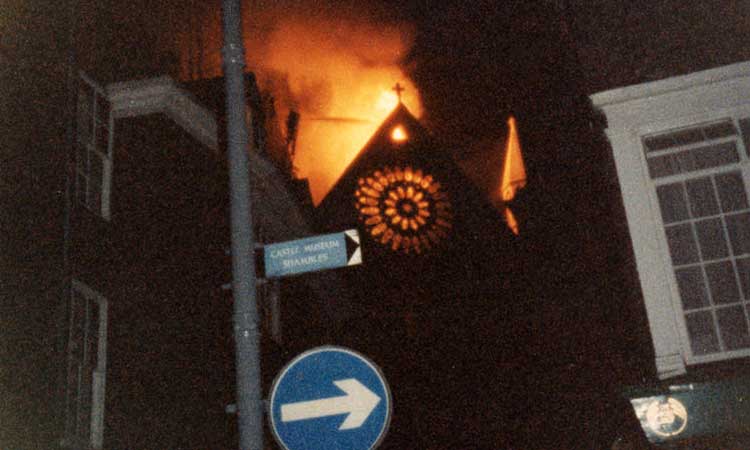Thirty years ago a bolt of lightning hit York Minster starting a blaze that would destroy the roof of the South Transept.
The fire happened two nights after David Jenkins was consecrated as Bishop of Durham in the Minster. He had caused a fuss inside the Church and out by questioning the literal truth of the virgin birth or miracles such as Jesus walking on water.
As the clear up took place in York, and a fundraising campaign began to restore the Minster, the columns of The Times were filling up with letters about the blaze…
‘The wrath of God’
July 11, 1984
Sir,
The news recalled to my mind the prophet Elijah calling down the “fire from heaven” which consumed the altar to the Lord which he had built in the presence of the prophets of Baal; and I wondered wryly if the fire in the Minster was also the almighty fire threatening to burn down a cathedral in which recently there had been consecrated a bishop of our Anglican Church, who publicly expressed disbelief in several tenets of the Christian faith shared by all confirmed members of the Church.
I am, Sir, yours sincerely,
ANTHONY J. PETTITT,
Bromley, Kent
“Just lightning” says the Bishop dismissively. To those as old-fashioned as I, lightning is the wrath of God.
Yours etc.
DOROTHY J. RUSSELL,
Croydon, Surrey
After the York Minster fire had been successfully contained, the Archbishop of Canterbury, Dr Robert Runcie, repeated the words of the chief fire officer that “the Lord was on our side as we battled with those flames” (report, July 10).
I wonder whom He supported when the conflagration started.
A WISEMAN,
Maidenhead, Berkshire.
‘What sort of god do you believe in?’
July 12, 1984
From the Archbishop of York
 Sir,
Sir,
I read with astonishment some of the letters in today’s Times (July 11), the first copy I have been able to obtain since reluctantly leaving York Minster at 5am on Monday morning after hearing the reassuring words that the fire was out…
I feel I must point out the disturbing implications of those letters which somehow seek to link the fire with some remarks made by a bishop-elect on a TV discussion programme. What kind of a god do your correspondents believe in?
I grant that if we still lived in biblical times, and if it was customary to treat thunderstorms as some kind of messengers from God, then the connection might seem inevitable…
But to interpret the effect of a thunderstorm as a direct divine punishment pushes us straight back into the kind of world from which the Christian Gospel rescued us. Is illness a divine punishment? Ought we to ask after a car crash whether the car was carrying some outstanding sinner?
Yours faithfully,
✝ JOHN EBOR,
World Council of Churches,
1211 Geneva 20, Switzerland.
‘The last trump’
July 13, 1984
Sir,
Perhaps Dr Runcie is being too cautious in dismissing the notion that the sad havoc wrought to York Minster yesterday was an act of God. It was, after all, one of his predecessors of whom it was said that had it been reported to him that the last trump had sounded he would immediately have set up a commission in order to discover if it was the last trump or the last trump but one.
Yours faithfully,
G. CHOWDHARAY-BEST,
27 Walpole Street, SW3.
‘Faulty’ Archbishop
July 14, 1984
Sir,
Do we really have an Archbishop of York who needs lessons in elementary theology? He asks whether illness is to be regarded as punishment. Any psychiatrist, most doctors and a cursory glance at the daily newspaper would enlighten him, even supposing he did not know the biblical answer, which is “sometimes certainly, but not always”.
He goes on to ask whether we are to regard car crashes as applying only to sinners. The answer to that has to be yes, unless he knows of someone (other than the Lord Jesus Christ) who is not a sinner…
If the Archbishop really believes that we are living in extra-biblical times, as his letter suggests, how else does he expect the Almighty to communicate? Through John Ebor’s reason? Sir, I submit that that medium is faulty…
Yours faithfully,
ELIZABETH ARBUTHNOT,
12 Edge Street, W8.
‘Turn it into a leisure centre’
Miles Kington, July 13, 1984
The Times’ humorist Miles Kington, inspired by the early correspondence, decided to invent some letters to the editor of his own
I have now come to the conclusion that listing, which is meant to preserve a building, may have the opposite effect – that, in fact, buildings are endangered by being listed in some way we do not yet understand. As an experiment, I suggest that we put on to the historic building list several structures that we want to see burnt down, and see what happens.
Yours etc,
SIR GAVIN CAISSON.
We have much experience in the field of modern leisure centres, and believe me, the tragic damage to York Minster could be a blessing in disguise. For example I could turn the damaged transept (is that the right word?) into a major tourist attraction by the end of 1985. Perhaps you could put me in touch with the owners of the cathedral.
Yours etc,
HUGO LIGHTLY.
